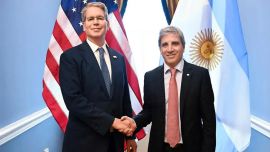US financial backing alone won’t stabilise Argentina’s finances without a significant shift in monetary policy, according to former IMF officials and economists.
Experts consulted by the Buenos Aires Times – including two former International Monetary Fund officials, an Institute of International Finance economist and a former finance minister from the Americas – warn that Washington’s support will offer only temporary relief.
President Javier Milei’s government will have to abandon foreign exchange rules and let the peso float, likely with a large devaluation, they added.
“The US$20 billion swap and another US$20 billion in private funding – which we don’t know yet how it will be distributed – will not be enough to cover upcoming maturities if Argentina’s government continues with its current monetary policy,” said a former Argentine representative to the IMF, speaking on condition of anonymity.
Argentina has up to US$10 billion in debt due by the end of the year, with maturities of US$28 billion in 2026 and US$36 billion in 2027. Finance Secretary Pablo Quirno also announced Monday that Buenos Aires has opened negotiations to buy back sovereign debt, with JPMorgan Chase & Co assisting the process.
Since April, Argentina has operated a managed-float regime that lets the peso trade within a band that widens by one percent each month. The upper limit is set to rise to 1,496 pesos per US dollar by the end of October.
Despite US intervention in currency markets over the past week, the peso has continued to weaken, trading at 1,477 per dollar on October 20 – just 1.1 percent below the ceiling of its target range.
“US support may temporarily ease Argentina’s financing needs, but it cannot substitute credible monetary policy. Milei should stop defending the peso and instead focus on rebuilding dollar reserves” at the Central Bank, said Héctor Torres, a former IMF executive director, in an interview.
The Central Bank’s gross international reserves have declined to US$41.2 billion as of October 17, down from US$42.2 billion a week earlier, according to its daily reserve publication. Net reserves are much lower, but are not reported officially.
Milei’s administration has so far resisted a full float for the peso, arguing that a sharp devaluation would fuel inflation.
Although Torres believes US financial support could help Argentina regain access to private capital markets, he warned that excessive reliance on senior creditors, such as the US Treasury and the IMF, could limit the Milei administration’s ability to obtain private financing.
US Treasury Secretary Scott Bessent said several times last week that Washington is directly intervening in the Argentine exchange market by purchasing pesos, arguing that the Argentine currency is undervalued.
The US Treasury has purchased around US$339 million worth of Argentine pesos between October 9 and 15, according to the 1816 financial consultancy firm in Buenos Aires, but its limit remains unclear.
“I don’t think the US Treasury will use more than US$1 billion buying pesos. They are providing a US$20-billion swap to get China out of the way, but they are really making these announcements to cheer on the market’s animal spirits,” said Jonathan Fortun, an economist at the Institute of International Finance (IIF).
“US financial support isn’t infinite. They say they are buying bonds, but I think after Argentina's midterm elections on October 26 the US will say: we tried helping, but we aren’t going to put more money in,” Fortun told the Times.
This week’s trading will be very important to see whether more intervention will be needed, the IIF economist added.
With key midterm elections ahead this Sunday, most economists believe Argentina’s government will have to let the peso float and scrap the current monetary scheme.
“It’s inevitable that the government will have to let the peso float, and the decline could easily be 40 to 50 percent. Argentina needs an exchange rate normalisation that allows the market to decide the peso’s true value," considered Manuel Hinds, a former finance minister for El Salvador.
“Argentina is like a patient whose leg has been cut off and is bleeding profusely. It doesn’t matter how much blood you transfuse unless you suture the wound,” said Hinds.
























Comments